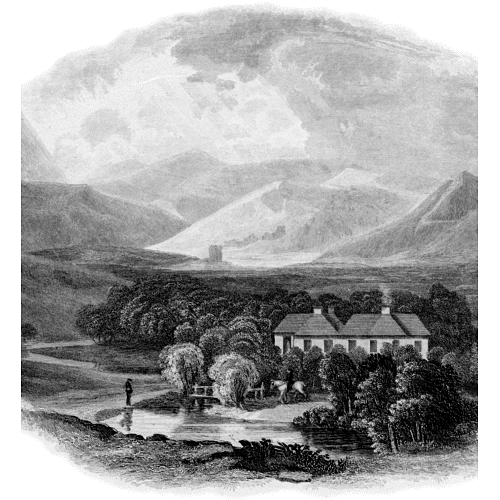A History Maker (20 page)
Authors: Alasdair Gray
  Â
They refused to be accepted singly into families or co-operative satellites where they would receive the friendly, careful attention due to the immature. They asked for a habitat of their own and were given a station on Titan where they could only maintain their lives by working so co-operatively that their children (should they have any) could not be corrupted by antisocial examples. Through years during which the effects of the plague were being mastered this station remained a stubbornly silent part of the intelligence network, receiving information from it but returning none. Then one day they suddenly entered a music channel as a song group called The Plagues. In harsh discordant voices they mocked every aspect of modern life they thought stale, smug and
stupid. They were popular with children. Adults thought their broadcasts were signs of returning sanity. If Napoleon's poetic ambitions or Hitler's artistic ones had been attended to and encouraged they would have done less damage.
  Â
So, the old ladies' speedy discovery of the Puddock Plot probably stopped mankind reverting to historic barbarism.
Page 152.
There was hatred in what she did with me
last night but nothing calculating, nothing
political. It's a miracle that she's needed me
all these years.
Meg Mountbenger had a rare, quick, energetic nature, slow to develop and held back from emotional maturity by a childhood sense of unattractive loneliness, maybe because her mother had weaned her too soon, maybe because her dad was a gangrel. Only aunts and grandmothers knew who her father was, but it may have influenced them into treating her like the outsider she became. When five years old she grew so devoted to a girl friend from Mountbenger that she insisted on going to live there, perhaps thinking she would be more popular than at Dryhope. Her later furtive visits to Dryhope suggest she was disappointed.
Always on the edge of family life she recognized Wat as one of the same sort. Unluckily Wat, like most males, wanted girls who were his opposite and treated her with the disdain he had learned from Kittock.
  Â
Like all intelligence networks the grannies could make mistakes. Before Haldane died too many old ladies thought talented malcontents were best occupied turning remote space stations into worlds of their own. From the age of twelve Meg Mountbenger had wished to work in a cloud circus. Instead the grannies deflected her to K20, making that unhealthy concentration of egoists even less stable.
  Â
Like all those working on K20 she was immediately enrolled as an immortal. At that time the damaging effects of rejuvenation on the young was only suspected and Haldane, oscillating between a boyish fifty-eight and sixty-five, looked forward to an eternity of exploiting bright young people. For them work with the great satellite designer seemed heaven, at first. They worshipped him as young Italian artists worshipped Michelangelo, imitated him as young German Protestants imitated Luther.
  Â
Meg's work and membership of Haldane's
harem may have made her happy until rejuvenation restored her adolescence. Losing seven years of sensory experience causes an emotional void in old and young alike, but hurts the young most because they have poignant memories of a recent-seeming but remote past. Meg's obsession with Wat returned. It was worse for being with a man who had forgotten her, grew worse still after her second rejuvenation. She was thirty now and the awkward young lad she remembered rejecting her three years earlier (seventeen years in communal time) was now a famous hero in a world more intricate and beautifully varied than any Isaiah Haldane could create, a world which still housed the greatest number of people in the universe.
  Â
By this time most of Haldane's team were sick of him and life on K20. Someone smashed his head in a way which made repairs impractical; the rest refused to inform on the killer. More grief would have followed if humanity had not dispensed with elaborate laws and police forces. The open intelligence network knew Haldane had been a brilliant but selfish man who had made good things in his hundred and six years but had begun to repeat himself so could only impress the young. His
former colleagues were advised to let twenty-one years pass before they rejuvenated again; this would make them less impatient with the elderly. All but five found work on other satellites or the moon. Meg and four others asked the Global and Interplanetary Council for Age Regulation Sitting in Lhasa for permission to work on earth. This was granted when they promised to stop rejuvenating. It was a promise they gave but meant to break.
  Â
For at least six years before Haldane's murder the group of five had planned to combine eternal life with earthly power. They meant to grasp it by putting mankind into a state of competitive anarchy, breaking up the open intelligence network and restoring government by minorities. They planned an alliance with a military élite amidst the chaos of a worldwide food and energy famine. That is why Meg, their chief agent, got work with a circus which specialized in celebrating military triumphs. So Meg Mountbenger's seduction of Wat Dryhope was both personal and political. She hoped to seduce him into her plot. Failing that she infected him against his will.
  Â
When Wat Dryhope returned from his Ben Nevis quarantine to Ettrick he worked hard at
planting, hoeing, mill building et cetera between fierce bouts of drunkenness. Women stopped liking him and he seemed to have lost interest in them. He worked less frantically in the second year when the effects of plague were obviously being mastered. He boozed more but wrote
A History Maker
. Having given it to his mother he said, “Now I'm going for Meg.” His mother told him the open intelligence had found no news of Meg Mountbenger so she was most likely dead, probably by suicide. He said, “Meg is too brave and too competent to end that way. She's done what I would do if I were her â turned gangrel. I'll track her down, Kittock. I'll kill her for what she did to me, then I'll kill myself.”
  Â
He left Dryhope house and has never been seen since by any who admit knowing him.
Page 153.
But Meg Mountbenger is another kind of
woman altogether. She's also your â¦
The unspoken word, of course, was
sister
.


W
HEN FEDOR HAKAGAWA WAS recording folksongs of the Irish vagrants in Donegal several years ago he encountered the following rhyme:
O Wat was a nasty old tinker,
And Meg was his nasty old wife,
They hated none more than each other,
They lived in contention and strife
.
  Â
He battered her when he was sober,
She kickit him when he was drunk,
The broken-nosed toothless old gangrels
Yelled, fought, fornicated and stunk
.
  Â
He glowered at each look that she gave him,
She spat at each word that he uttered,
Each hated the other so hotly,
They didnae think other folk mattered.
Hakagawa noticed that rhythm, diction and sentiments were more Scottish than Irish and was told it commemorated a couple of travellers
who had lived in dens and sea caves round the northern shores of Scotland and Ireland, drifting with the currents across the strait between Kintyre and Antrim in borrowed or stolen boats. They were noted for almost total silence when forced into the company of others by hunger, foul weather or accident. They were also noted for being violently quarrelsome when they thought they were alone.
  Â
Researchers in Scotland have learned the couple had been known (though only to other gangrels) as far north as Caithness and Sutherland, as far east as Buchan and Fife, as far south as Clydesdale, but had always avoided the ScottishâEnglish borders, a region most travellers like for its fertile commons and hospitable homesteads. This was also the region where Wat and Meg's affair had become a popular legend of love that had shaken the world. A version of the song recorded near Freuchie, in Fife, has a verse not known in Ireland.
When one broke their neck in a tumble,
(It doesnae now matter just which)
The tither, with naebody else to detest,
Starved to death in the very same ditch.
All four crude verses are now added to Wat
Dryhope's and Meg Mountbenger's intelligence archive with a question mark following it. They were probably composed after the couple described got buried in unmarked graves. Nobody can be sure they were the hero and villain of this tale, but such an ending for Kittock's son and daughter seems as likely as murder and suicide, and more in keeping with modern notions. We prefer the comic to the tragic mode.


Altrieve Cottage,
home of James Hogg, the Ettrick Shepherd,
looking toward Mountbenger
around 1820
